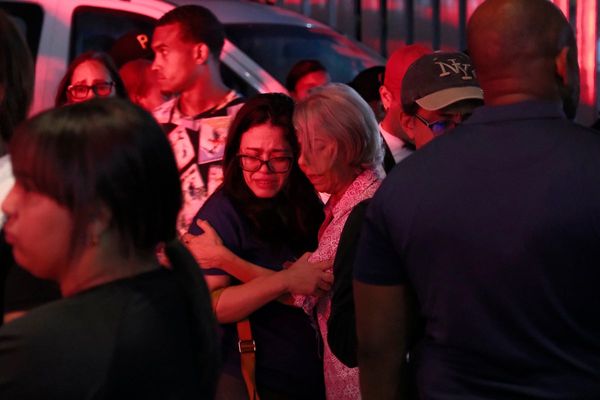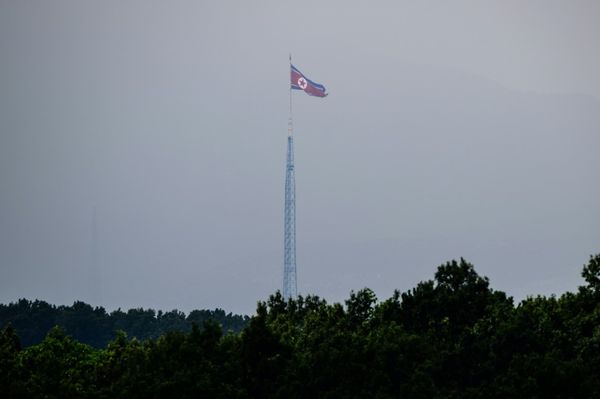LOS ANGELES — Cristela Alonzo is settling into a booth at members-only Soho House in West Hollywood, well-heeled professionals and the creative class carrying on their midmorning affairs around her, when she explains the reason for her brief delay: She was trying to find street parking.
For a first-generation Mexican American who spent the first seven years of her life living in an abandoned diner where her mother cooked dinner on a space heater, taking up space where she would ordinarily feel like an outsider is worth the membership cost: "You have to teach people that we belong everywhere," she says. But she's not paying $9 for valet if she can help it.
Alonzo, 43, has been in the midst of a soft return to Hollywood after years of feeling abandoned by it. Her trailblazing feat of becoming the first Latina to create and star in her own network sitcom, "Cristela," was short-lived and, as she boldly made known in the days following its 2015 cancellation, often frustrating. In the time since, she shifted her focus to community activism and the fight against former President Donald Trump.
As she's been slowly circling her way back into the industry fold, her comedic observations about life — which first propelled her career nearly two decades ago — remain a key constant. More than five years after her first Netflix stand-up special, "Lower Classy," which centered on her upbringing in South Texas, the comedian returns this week with a new special for the streaming giant titled "Middle Classy."
That a follow-up special materialized at all was part of the reacclimation process, she says.
"You get to the point where you kind of see that the dust is settled with the awkwardness and the initial shock of everything," Alonzo says. "Now I feel 100%. ['Lower Classy'] was the first thing that I wanted to do — the special was kind of like a 'let me test the waters.' But can I get another special? Do I want to do another special? And I loved it. I always loved it. But sometimes you love things so much that it hurts when it doesn't work out.
"I feel like I'm in such a different place when it comes to understanding that, growing up, this dream was all I ever wanted. And the past couple of years, I realized that everything I've lived actually shapes the dream for me. I wasn't sure if I was ever gonna feel really ready. And by ready, I mean excited to come back."
If anything was clarifying about her time away, Alonzo says, it's that she still has so much more to say — and some of those long-simmering thoughts take form in "Middle Classy." The special features appearances from Dolores Huerta, who co-founded the United Farm Workers union 50 years ago with César Chávez, as well as Rep. Joaquin Castro of Texas — two figures in politics and advocacy with whom Alonzo has developed close relationships through the outreach work she's devoted herself to in recent years.
"It was this thing where I thought: How can I show people where I am at in life, but also, how I'm different from other comics?" she says.
Alonzo's persona — often punctuated by an open-mouthed smile and wide eyes for effect — soaks up the spotlight in this new hour, as she playfully banters with the audience as if making the rounds at large Latino family gathering. She leans into self-mockery while providing social commentary on a range of topics: her bout with COVID (which delayed the taping of the special), growing up in a mixed-status family and her first experience at Olive Garden, as well as living in poverty and the revelations that come with access to healthcare.
"We are taught that our worth is tied to so many tangible things that some of us don't have access to," she says. "Therapy is something I considered luxurious because of the lack of money. I talk about it on stage — I'll tell people I suffer from depression because that's, like, a rich word. You have to invest so much money to find out you're depressed that you're like, 'I want to show off that I figured out what's wrong with me.'"
"When you're living your life in survival mode, there's really never a moment where you feel like you're caught up," she adds later. "Even if you're doing great, you're still surviving. And there's something about that, that I'm constantly trying to work on."
Comedian Anjelah Johnson-Reyes, a longtime friend who came up in the L.A. comedy scene around the same time as Alonzo, describes her as being "as real as it gets": "When you hear her tell stories about her family or even the way she talks about the racist experiences that she's had growing up — she has everybody cracking up at her expense, but at the same time, it's not degrading in any way."
"She wasn't an overnight sensation — and still isn't," says fellow comedian Steve Halasz, Alonzo's former boyfriend and longtime friend. "It's years and years of being dedicated to the passion and the work and doing the best work in the moment and hoping it pays off in the long run."
'That's not what we do'
Alonzo grew up in the Rio Grande Valley, one of four kids of a hard-working single mother. (She was estranged from her hard-drinking father.) After living as squatters, her mother moved the family into a humble house where Cristela shared a twin bed with her mother until she graduated from high school. The television not only became the family's reliable babysitter; Alonzo learned English with help from shows like "The Golden Girls" and "The Cosby Show." Alonzo spent her childhood grappling with poverty and identity but also dreaming of a life where it would all lead to something bigger, like the lives of the characters she'd see play out on screen.
The wonder of a life onstage took shape after she watched a Tony Awards telecast for the first time in middle school. While other kids were playing sports or making the rounds at the mall, Alonzo began taking drama classes and participated in theater tournaments, racking up trophy after trophy.
"My mom couldn't get it," she says. "She asked me, like, 'Are you stealing these trophies?' She thought I was beating up people to bring them home. She couldn't understand that I would be good at it because in her mind, it's like, 'Well, but that's not what we do.' She always wanted to be a singer. She never tried, though."
The desire to reach beyond the life in front of her while fighting the pull of circumstance would become a recurring theme for Alonzo. When she enrolled at Webster University in St. Louis in 1997 to study theater, a decision that devastated her mother, she had to drop out after a year to help her sister with her kids. The first time she moved to L.A., around 2000, she lived with two roommates in a studio apartment in Hollywood, working a travel agency gig she scored from a fellow musical theater fan she met on the internet. Alonzo had lived worse, but at least she was living in proximity to the dream-making. Until her mother's health started to decline, and she journeyed back home again.
"She begged me not to go back — she said that I was the reason she didn't die," Alonzo recalls. "She begged me not to leave again. What am I going to do? ... I'm Mexican. We ended up having to move into my sister's house with their kids."
Alonzo's mother died in 2003. She couldn't afford therapy so she started writing about her mom as an outlet for her grief —and unlocked material for stand-up comedy. She moved back to L.A. in 2005 and started to build a name in the comedy scene, landing a short stint writing for Carlos Mencia's "Mind Over Mencia" and touring the college comedy circuit.
"I always say that sometimes life happens, and it makes you stop," Alonzo says.
"Losing my mom was the reason that I really decided to come to L.A. and chase after the career. My heart was so broken that I realized the business wouldn't hurt me. None of it could be worse than losing the most important person in my life."
'I'm up against these forces that I can't define'
By 2013, Alonzo had received the opportunity to turn her stand-up material into a semiautobiographical TV pilot, "Cristela." Alonzo's TV alter ego was an aspiring lawyer living rent-free with her sister's family, alongside their mother, while she finishes law school. When "Cristela" ultimately premiered on ABC the following year, four years had passed since a Latino family had been showcased on a network series ("Ugly Betty"). Launching the same year "black-ish" made its debut on the network, "Cristela" was slotted on Friday nights, sandwiched between "Last Man Standing" and "Shark Tank." It was canceled after one season.
Days after the show's cancellation, Alonzo wrote a blog post decrying the lack of network support: "It was a multi-cam sitcom that SOMETIMES aired on Friday nights," it read. "I say sometimes because a lot of times we were pre-empted for more important things like an Easter egg hunt happening in real time. Kidding. In reality, we were preempted for other things like a documentary on a parade and some other things I can't remember. I think one night was a show about Christmas lights?"
Alonzo says she was more direct with network brass: "I let everybody know. Because, to me, if I don't do it, who's going to do it? I was very upset with everything. I got into a fight with a lot of people. Again, I was seen as 'difficult.' The question that I'd love to ask a lot is 'Why?' People hate 'Why?'"
Alonzo comes alive when she details her vision for the rest of the series: Cristela and her mom move out of her sister's home; they become roommates. Cristela starts seeing her co-worker Josh and her mom ends up loving Josh more than her. Cristela ends up becoming partner at the law firm. And it all leads up to the day Cristela's mom dies.
"The note that I would get [for the show] was, 'We need more ascension,'" she says. "I always argued: You don't. You want to show rich people. Ascension is the process of getting there. So if you want ascension, I would love to have furniture that changes. The reason that the refrigerator and the stove were old was because I wanted to change them. I wanted to make an episode about, like, the big decision of having to buy the new thing, but understanding that you have the money to do it now."
These days, the first and only season of the sitcom is available to stream on Hulu, but she hasn't been tempted to watch it.
"I refuse," she says. "To be honest, when the show got canceled, I was really going through a lot of emotions. I didn't know if I wanted to continue the business. You try, you try, and then you realize: I'm up against these forces that I can't define."
'Not a red carpet activist'
In the years after the cancellation of "Cristela," Alonzo became the first Latina to voice a leading role in a Pixar movie as Cruz Ramirez in "Cars 3" and released her first Netflix special. But it was hard to be excited about anything, she says, considering what was going on in the world with Trump in power, spreading his anti-immigration rhetoric.
"I was with Dolores Huerta the night of the [2016] election," she says. "And we were talking about how sometimes, whatever feelings you feel, you still have to live your life. And sometimes you have to take a minute to think about what you want and where you want to be. I emailed my reps, and I said, 'I think I'm done for a bit. I don't want to do anything. Don't come to me with offers. Nothing. I need to focus on what's most important to me. And right now, it's making sure that people like my family are gonna be OK under Trump. I'm walking away from this. I don't want to hear from you until I email you.' And I quit."
During this hiatus, she began work on a memoir, "Music to My Years," and became heavily involved in advocacy work, championing issues such as immigration and universal health care, while also trying to boost voter mobilization.
Jose Antonio Vargas, the founder of Define America, a media and culture organization that aims to promote dialogue around immigration issues, met Alonzo in 2016 while participating in an Immigration Heritage Month event. As their friendship deepened, he's been struck by her dedication.
"Cristela is a real activist, not a red carpet activist," he says. "I think it awakened in her that she is not only a member of this community, but a leader in this community — that she has a voice. And it made her really think about how to effectively use that voice. She brings this level of specificity from where she comes from and what she's overcome."
"I was doing all this work and meeting more people, and in meeting more people, I was finding that people seemed very happy to meet me," says Alonzo, who serves on the advisory board for Define America. "And they were talking about how my show was something that they really loved. And it felt so good to be remembered by, not the industry, but by people that saw it."
The feedback motivated her enough to email her reps. She was ready to try again.
This past October, she hosted the CW's revival of the popular Nickelodeon game show "Legends of the Hidden Temple"— minutes before she interviewed for the job, she got a call that her sister had a stroke — and, by December, saw the debut of the Lifetime holiday movie she wrote, "Holiday in Santa Fe," starring Mario Lopez and Emeraude Toubia. Alonzo has also been busy in a Tucson, Arizona, production of "How to Make an American Son," Christopher Oscar Pena's coming-of-age comedy about a father and son who are living two different versions of the American dream. Her character Mercedes delivers a rousing monologue about being born in America, but treated like a foreigner.
Alonzo is not sure when she'll be the creator and star of another TV show, but she's been reworking a pilot she began developing before Trump won election, loosely inspired by her time as a guest host on "The View": "It's basically a Latino Rachel Maddow, who moves into the big city and her appeal is that she can talk to everybody." When James Corden announced he was stepping down as host of "The Late Late Show," Alonzo let it be known on Twitter that she was ready to inherit the role.
"If I don't throw my name out," she says, "you're gonna get a lot of the same people that you always get."
———







